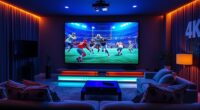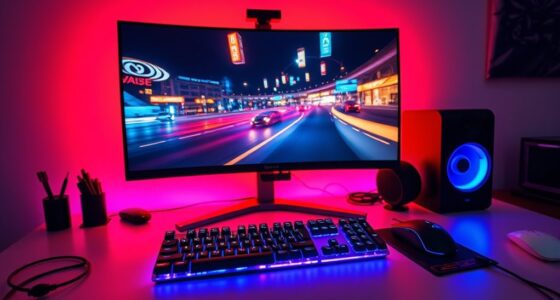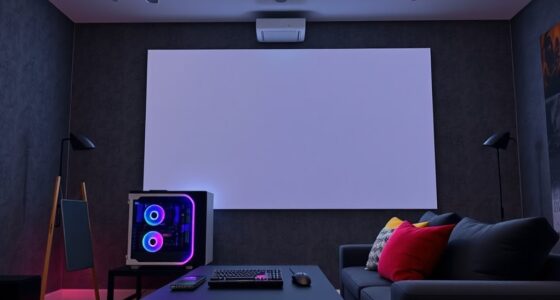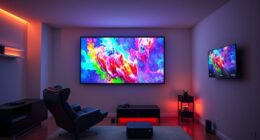If you prioritize immersive, massive screens for an cinematic feel, a projector offers a big advantage, though it may have higher input lag and require more space and setup. On the other hand, a TV provides quicker responses, convenience, and a more straightforward setup, making it ideal for competitive gaming. Deciding depends on whether you value size and immersion or responsiveness and simplicity—keep going to discover which suits your style best.
Key Takeaways
- Projectors offer larger screen sizes for immersive gaming but require controlled lighting and more setup.
- Gaming TVs provide better responsiveness with lower input lag and are more convenient to install.
- Projectors excel in creating cinematic experiences but may struggle with ambient light; TVs perform reliably in varied lighting.
- High-end gaming TVs deliver superior picture quality and quick response times, ideal for competitive play.
- Choice depends on room space, desired immersion, responsiveness needs, and convenience preferences.

When it comes to gaming, choosing between a projector and a TV can substantially impact your experience. One of the most noticeable differences is screen size. Projectors excel at creating massive displays that can span 100 inches or more, immersing you fully into the game world. This large screen size can make gameplay more engaging, especially for open-world or multiplayer games where you want to see more detail without squinting. On the other hand, TVs typically come in standard sizes, ranging from 40 to 85 inches, but their screen sizes are more consistent and don’t require additional space or setup. If you prioritize a cinematic feel and a broad field of view, a projector might be your best pick. But if space is limited or you prefer a more straightforward setup, a large-screen TV offers convenience without sacrificing much in size.
Input lag is another *vital* factor that can influence your gaming performance. Input lag refers to the delay between a command you make—like pressing a button—and its action on the screen. For fast-paced games, even a slight delay can mean the difference between winning and losing. Modern TVs often include gaming modes designed to minimize input lag, making them suitable for competitive gaming. However, some older or cheaper models might have higher input lag, which can hinder your responsiveness. Projectors generally have a longer input lag compared to gaming-focused TVs, mainly because of their processing requirements and display technology. If precise timing and quick reactions are *essential* to your gaming style, this can be a significant drawback. To mitigate this, look for projectors with low input lag specs, but keep in mind that they might be pricier and less common than gaming TVs. Additionally, the picture quality and brightness levels of projectors can vary greatly depending on the model and ambient lighting conditions. If you’re after a simple, plug-and-play solution with excellent picture quality, a high-end gaming TV might serve you better. Conversely, if you’re after an immersive experience and don’t mind adjusting your environment, a projector can turn your gaming setup into a home theater. Ultimately, your choice depends on your gaming preferences, room setup, and how much you value size versus responsiveness.
Frequently Asked Questions
Which Is More Energy-Efficient for Gaming, Projector or TV?
A TV generally uses less energy than a projector for gaming, making it more power-efficient. TVs have lower energy consumption because they rely on LED or OLED screens, which are designed to be energy-efficient. Projectors, especially those with high lumens and bulb-based lighting, tend to consume more power. If you’re looking for better power efficiency and lower energy costs, a TV is the smarter choice for gaming sessions.
How Does Ambient Light Affect Gaming Performance on Projectors Versus TVS?
Ambient light critically impacts your gaming experience on projectors versus TVs. Bright surroundings reduce screen visibility on projectors, making it harder to see details and colors clearly. Meanwhile, TVs are generally more resilient to ambient light, maintaining better image quality. If your gaming space has lots of ambient light, a TV offers superior visibility, whereas projectors perform best in darker environments to guarantee ideal screen clarity.
Can Projectors Handle Fast-Paced, High-Refresh-Rate Gaming?
Think of projectors as the horse-drawn carriage of gaming tech—charming but not built for speed. They struggle with fast-paced, high-refresh-rate gaming due to limited refresh rate compatibility and higher input lag performance. While some newer models improve, most still can’t match TVs designed for quick responses. If you crave seamless, high-speed gameplay, a TV remains your best bet, ensuring smooth visuals and minimal lag.
What Are the Maintenance Costs Associated With Projectors Compared to TVS?
You’ll find that maintenance costs for projectors are generally higher than for TVs. With projectors, you need to contemplate screen longevity, as bulbs typically need replacing every 1,500 to 3,000 hours, which can be costly. Replacement costs for projectors tend to be higher due to bulb and filter replacements. In contrast, TVs are more durable, with lower ongoing costs, making them more budget-friendly over time.
Which Device Offers Better Sound Quality for Gaming Experiences?
A TV generally offers better sound quality for gaming experiences because it provides superior audio clarity and sound immersion right out of the box. You won’t need external speakers or sound systems, as many modern TVs include advanced built-in audio features. With a projector, the sound quality may be less immersive due to limited built-in speakers, often requiring additional audio equipment to match the immersive experience a high-quality TV can deliver.
Conclusion
Ultimately, choosing between a projector and a TV for gaming comes down to your preferences, your space, and your budget. If you value a cinematic experience, immersive visuals, and a flexible setup, a projector might be your best bet. If you prefer sharp images, quick responses, and convenience, a TV could be your ideal choice. Both offer unique advantages, both deliver excitement, and both can elevate your gaming—so pick what fits your style, your space, and your game.









